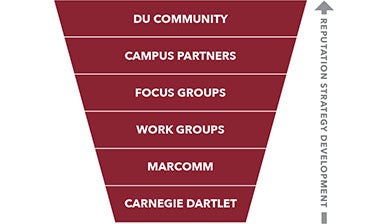Our brand is our business
Ask marketers to define “brand,” and you’ll find as many definitions as the people you ask. After reviewing a compilation of 30 branding definitions from 30 marketers, it was clear that, despite the varying words used to describe a brand or branding, several common elements such as differentiation, consistency, and positive perception were deemed important for a successful brand. In thinking about DU’s brand, I define it as the sum total of everyone’s experiences and interactions. It is rational and emotional. The value of a brand and branding isn’t something that just happens to you, it also happens with and through you.
Every touchpoint and experience with DU is a potential connection, and over time and with intention, all of these connections become the foundation of a relationship. Organizing around our promise, our purpose, and our value, while maintaining consistency in how we manage and communicate about them is necessary to cultivate those relationships.
When all of us brand owners—students, faculty, staff, and alumni—participate in branding the institution, we increase our impact and amplify the effect that our brand will have on our audiences. It becomes about more than just determining how we want to be perceived; it becomes about delivering on our promise. And in between the determining and the delivering, there must be some intentional communication and conversation. Building a brand is the job of everyone at the institution, not just the marketing department. DU’s brand is our collective business.
As we roll out our refreshed brand strategy, we will share it in phases built around specific stakeholders. If you imagine an inverted pyramid with the strategy as the foundation and each of our represented areas layered in incrementally, as the number of stakeholders expand so will the impact of our brand and efforts. As an added benefit of this consensus-based and streamlined approach, progress will be continual as the strategy naturally iterates based on feedback received from the expanding stakeholder groups.
Carnegie Dartlet, an external agency partnered with us, led us through the initial research and audience insights to inform our brand planning. Now MarComm is assuming the responsibility and final development necessary to implement the work. One of the ways this will happen is through work groups, consisting of MarComm staff and unit communicators focused on the development of our brand’s messaging, visual identity, advertising campaign, and campus toolkit/services. Additionally, regularly convened focus groups, comprised of representation from each of our brand owner categories and internal stakeholders, along with our partners in the Communicators' Roundtable, a fairly large group consisting of anyone with a communications or marketing role at DU, will be invited on the journey and be able to offer feedback and insights throughout. Finally, the entirety of our DU community (faculty, staff, students, alumni) will be introduced to the work through the rollout over the coming months.
With partnership and commitment across the entire University, this transparent and inclusive approach will lead to effective and lasting engagement with our audiences. This in turn will help ensure that DU has a long and sustainable future, built on meaningful relationships and clarity on what sets us apart.









